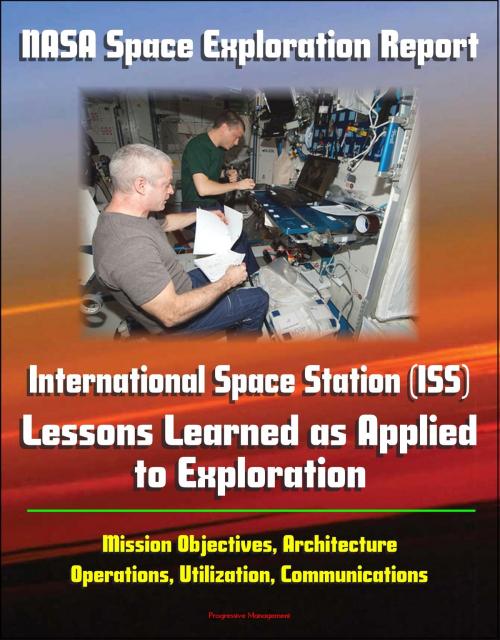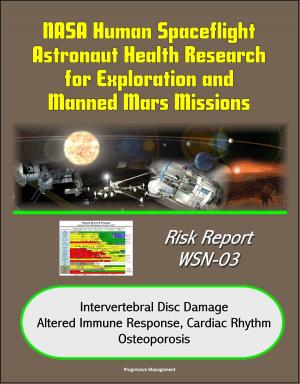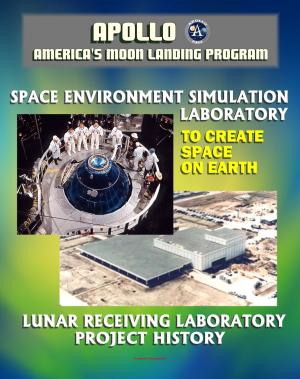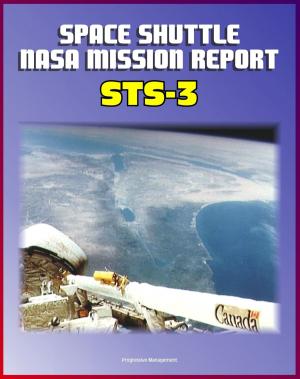NASA Space Exploration Report: International Space Station (ISS) - Lessons Learned as Applied to Exploration - Mission Objectives, Architecture, Operations, Utilization, Communications
Nonfiction, Science & Nature, Technology, Aeronautics & Astronautics, Science, Physics, Astrophysics & Space Science| Author: | Progressive Management | ISBN: | 9781310269042 |
| Publisher: | Progressive Management | Publication: | August 13, 2014 |
| Imprint: | Smashwords Edition | Language: | English |
| Author: | Progressive Management |
| ISBN: | 9781310269042 |
| Publisher: | Progressive Management |
| Publication: | August 13, 2014 |
| Imprint: | Smashwords Edition |
| Language: | English |
As construction of the International Space Station (ISS) approached completion, and the program's Multilateral Coordination Board (MCB) reflected on the process, they thought it would be valuable to future exploration programs to capture the lessons learned over the ISS design, development, assembly, and operations phases. A summary of this effort, as conducted by all of the ISS International Partners (the National Aeronautics and Space Administration, the Canadian Space Agency, the European Space Agency, the Japanese Aerospace Exploration Agency/Ministry of Education, Culture, Sports, Science and Technology, and the Russian Federal Space Agency), is provided below.
The results are organized in seven categories: Category 1 - Mission Objectives * Category 2 - Architecture * Category 3 - International Partner Structure and Coordination * Category 4 - External Communications * Category 5 - Operations * Category 6 - Utilization * Category 7 - Commercial Involvement. Each lesson learned is accompanied by a corresponding application to future exploration programs.
The ISS has proven to be an extremely valuable platform for exploring long-duration human stays in space. This is clearly necessary to prepare for human exploration of space beyond LEO. The uniqueness of ISS as a permanently occupied outpost in free fall provides an ideal testbed for determining the effects of long-duration spaceflight on humans, testing counter-measures against the health impacts and studying how accidental passengers such as micro-organisms interact with humans. In addition, the ISS allows us to perform many complex hypothesis-driven studies requiring human intervention or monitoring. This unique aspect should not be lost as we explore further out in space. Exploration science and technology should continue to take advantage of the human presence, the life-friendly environment and the possibility of long-duration free-fall study with the possibility of direct intervention that is only available on ISS.
As construction of the International Space Station (ISS) approached completion, and the program's Multilateral Coordination Board (MCB) reflected on the process, they thought it would be valuable to future exploration programs to capture the lessons learned over the ISS design, development, assembly, and operations phases. A summary of this effort, as conducted by all of the ISS International Partners (the National Aeronautics and Space Administration, the Canadian Space Agency, the European Space Agency, the Japanese Aerospace Exploration Agency/Ministry of Education, Culture, Sports, Science and Technology, and the Russian Federal Space Agency), is provided below.
The results are organized in seven categories: Category 1 - Mission Objectives * Category 2 - Architecture * Category 3 - International Partner Structure and Coordination * Category 4 - External Communications * Category 5 - Operations * Category 6 - Utilization * Category 7 - Commercial Involvement. Each lesson learned is accompanied by a corresponding application to future exploration programs.
The ISS has proven to be an extremely valuable platform for exploring long-duration human stays in space. This is clearly necessary to prepare for human exploration of space beyond LEO. The uniqueness of ISS as a permanently occupied outpost in free fall provides an ideal testbed for determining the effects of long-duration spaceflight on humans, testing counter-measures against the health impacts and studying how accidental passengers such as micro-organisms interact with humans. In addition, the ISS allows us to perform many complex hypothesis-driven studies requiring human intervention or monitoring. This unique aspect should not be lost as we explore further out in space. Exploration science and technology should continue to take advantage of the human presence, the life-friendly environment and the possibility of long-duration free-fall study with the possibility of direct intervention that is only available on ISS.















